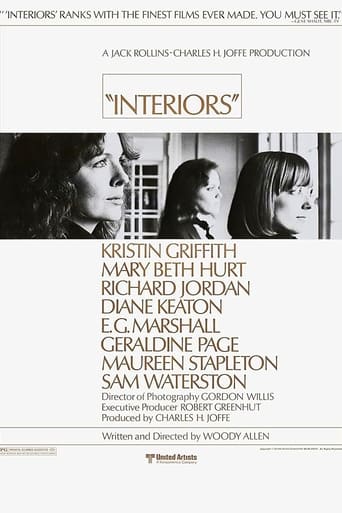crystal075-705-904023
Nothing could keep me watching this film after the first hour. Dialogue was putting me to sleep, and not just the burdensomeness that made me want to slink down and curl my shoulders forward, but the tone. And the sets. And the clothes. Bland and banal.This film felt like a wanna be Graduate or Last Tango in Paris. Although I do not expect the sensationalism of these films, I did hoped something would grab me, rather than making me exhausted because watching felt like work.
Mutoto
Interiors is often mentioned as Woody Allen's most serious film and for good reason. Humour, even dark humour, is practically absent from 'Interiors', as if Allen was trying to tell the world that he could embrace melodrama as genuinely as with comedy. His stylistic changes caused a lot of controversy at the time of release, but all these years after, what you have here is an amazing script, a very rigorous direction and as usual in Woody's films, a superb cast. All of the characters hide a lot more than what they show, their feelings, their fears, their frustrations. Never was the sense of loss as crushing as in 'Interiors', with no room for comfort. An amazing film to include among Allen's most accomplished works.
BitterJim
I'm a big fan of Woody Allen, and I just watched this movie for the first time. I can totally understand why many people hate it, or do not like it. It is depressing, and there's no real "finish" or arc for the characters.That being said, the one thing that stood out for me that nobody has mentioned, is that even Woody Allen didn't like the characters. I think that was his point. As some have pointed out, the characters are pretentious, self absorbed upper middle class yuppies with no real problems. I think what Woody Allen was doing, as was the case in Manhattan, was giving us a glimpse into that sort of liberal elitist upper crest society, where these characters in particular are pseudo-intellectuals and wannabe artists, who create their own problems that really don't mean anything.This would explain the introduction of Pearl, the fathers new fiancé. Pearl is great. Amidst all the self absorbed, elitist syrup the characters espouse relentlessly, Pearl emerges as almost a down to earth, working class gal.The family goes out to a play with their father and Pearl, and later while eating dinner, they are discussing this play. The daughters and their yuppy husbands are over analyzing the play to literally a puke inducing pretentiousness...and Pearl just chimes in "One character was a squealer, the other wasn't. I liked the character who wasn't a squealer. Thats all there is to it!" They try to argue with her with more pretentious drivel, and Pearl simply states again "The message I got was "dont Squeal." Later, Pearl is dancing to dixieland music with everybody, and knocks over a vase on accident, and the one daughter calls her an animal. Towards the end of the movie, Pearl ends up saving the daughters life with CPR after she nearly drowns. She seems almost ungrateful. Its as if this fmaily is so elitist, they look down on Pearl as some sort of "inferior".Pearl is a down to earth, normal, lovable older woman with some spunk, which is why the father fell in love with her. Throughout the movie, we see how dominating and obnoxious their mother is. She is pretty much the reason the family is dysfunctional, with her delusional, relentless whining, and quiet yet aggressive behavior. On top of that, she was a successful interior designer, and her 3 daughters are all "artsy" intellectuals...and you can see why a character like the father is just overwhelmed with them all, and falls in love with a very grounded, relatively simple woman, Pearl.I think it was Woodys purpose to make you feel burdened or overwhelmed by the characters, the mother...hell, almost feel completely alienated, only to suddenly find yourself relating to Pearl when she arrives.Another scene that kind of highlights the pretentiousness of the characters, one of the girls husbands is speaking into a tape recorder about marxism and communism, hinting that he is a supporter of such ideology. Which, again, is woody making a small point. Because here you have this wealthy, yuppy guy, embracing the concept of marxism.For anyone who grew up or lived around New York in the 60's and 70's, that was always one of those ironies...wealthy yuppy types preaching about marxism and communism. Its sort of a hypocrisy Woody Allen often points out in many of his movies.To summarize, this was a serious movie that essentially criticizes the upper class liberal crowd, as Woody has done in many of his movies. In Manhattan, Woody narrates in the film at the end about how its full of people with no real problems, so they create them. That is essentially the characters in this film. They want for nothing...so they began creating these "existential dilemmas".




